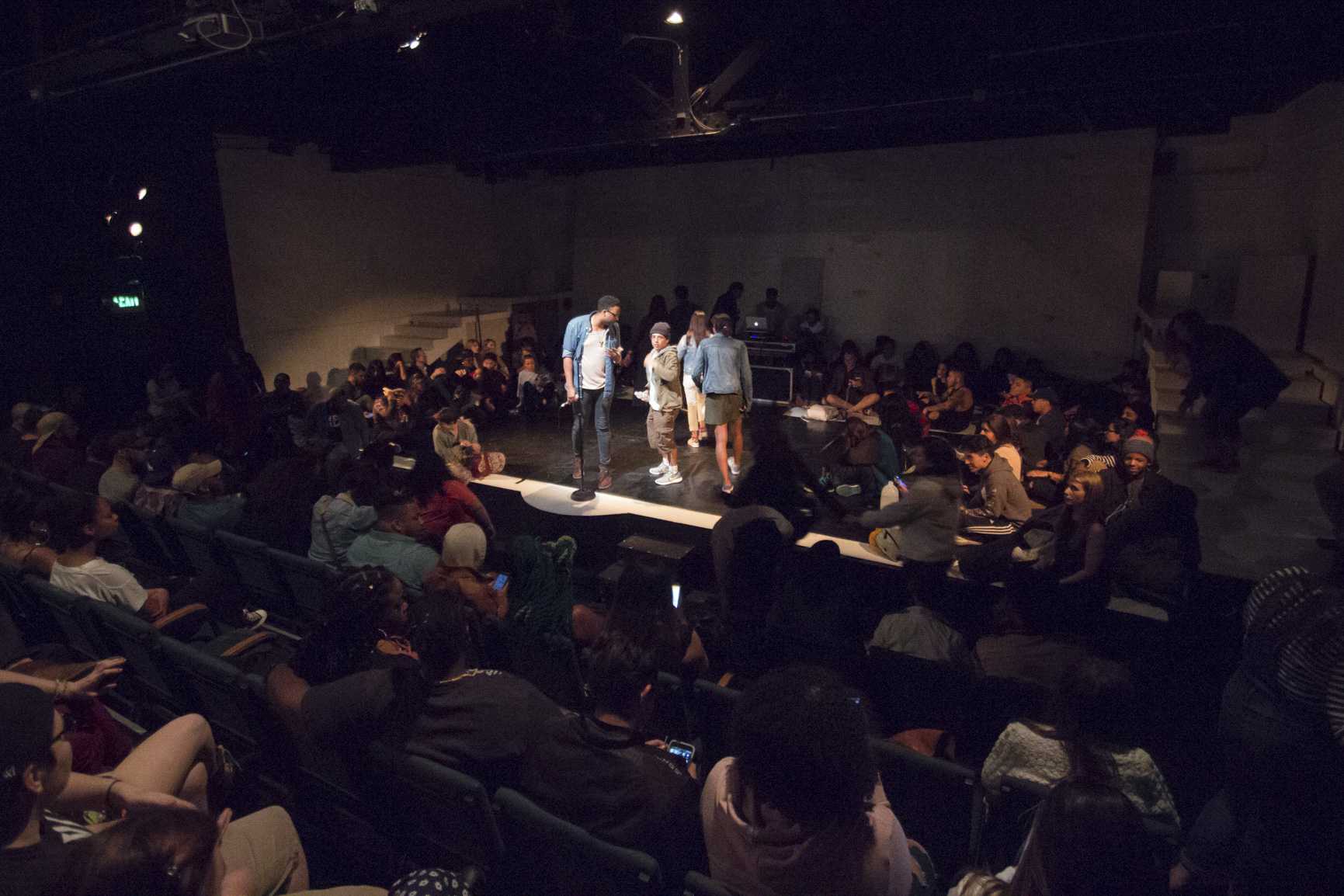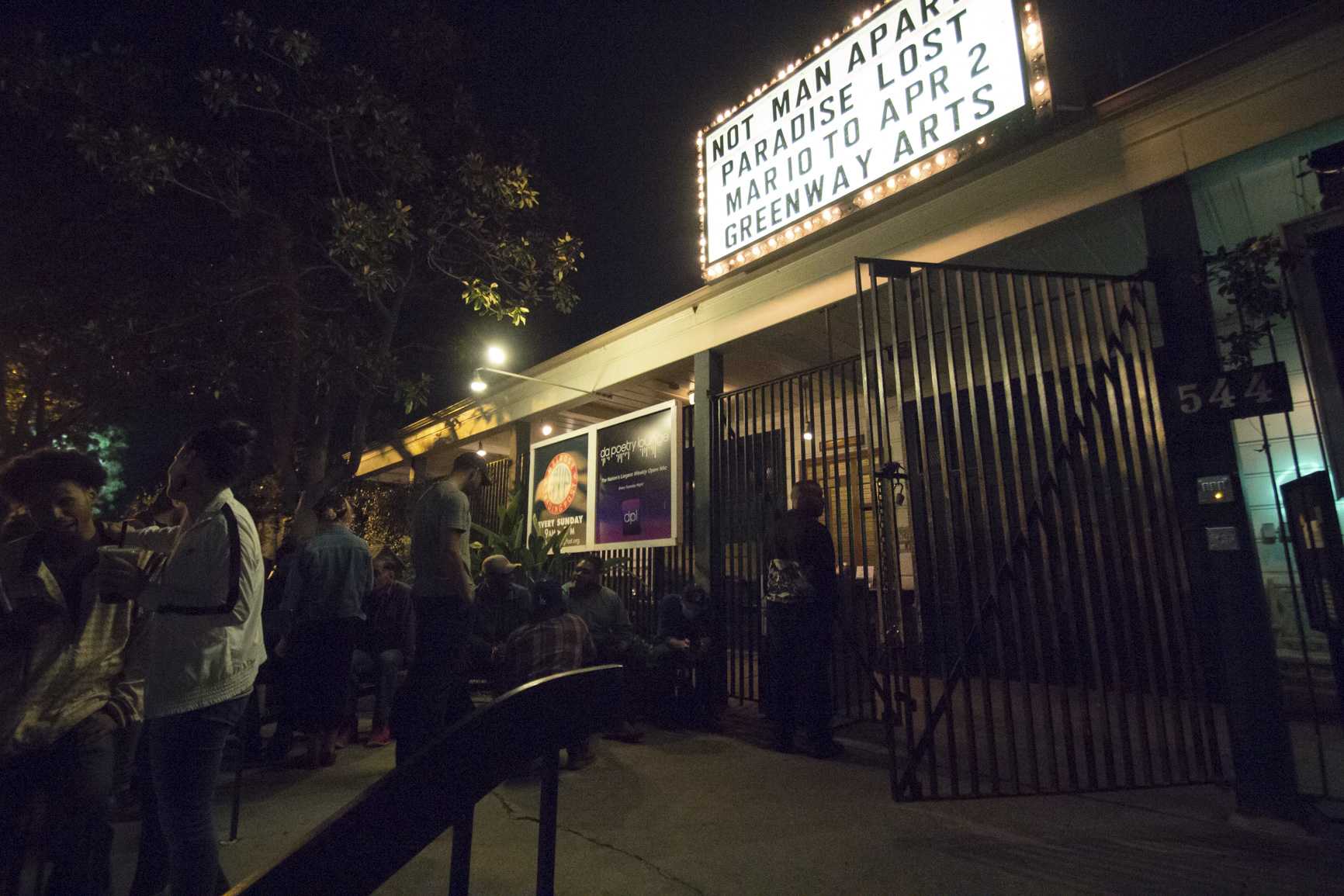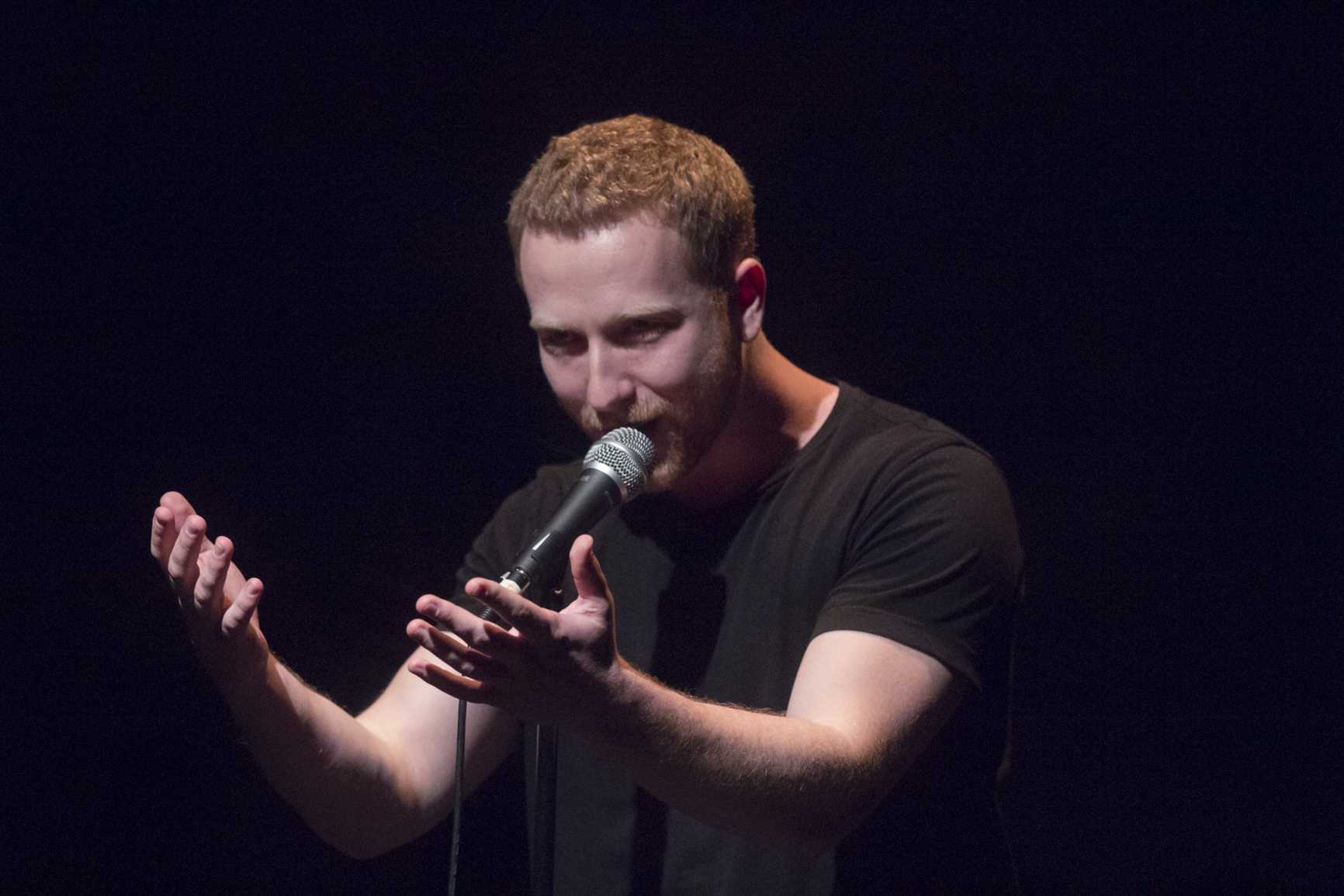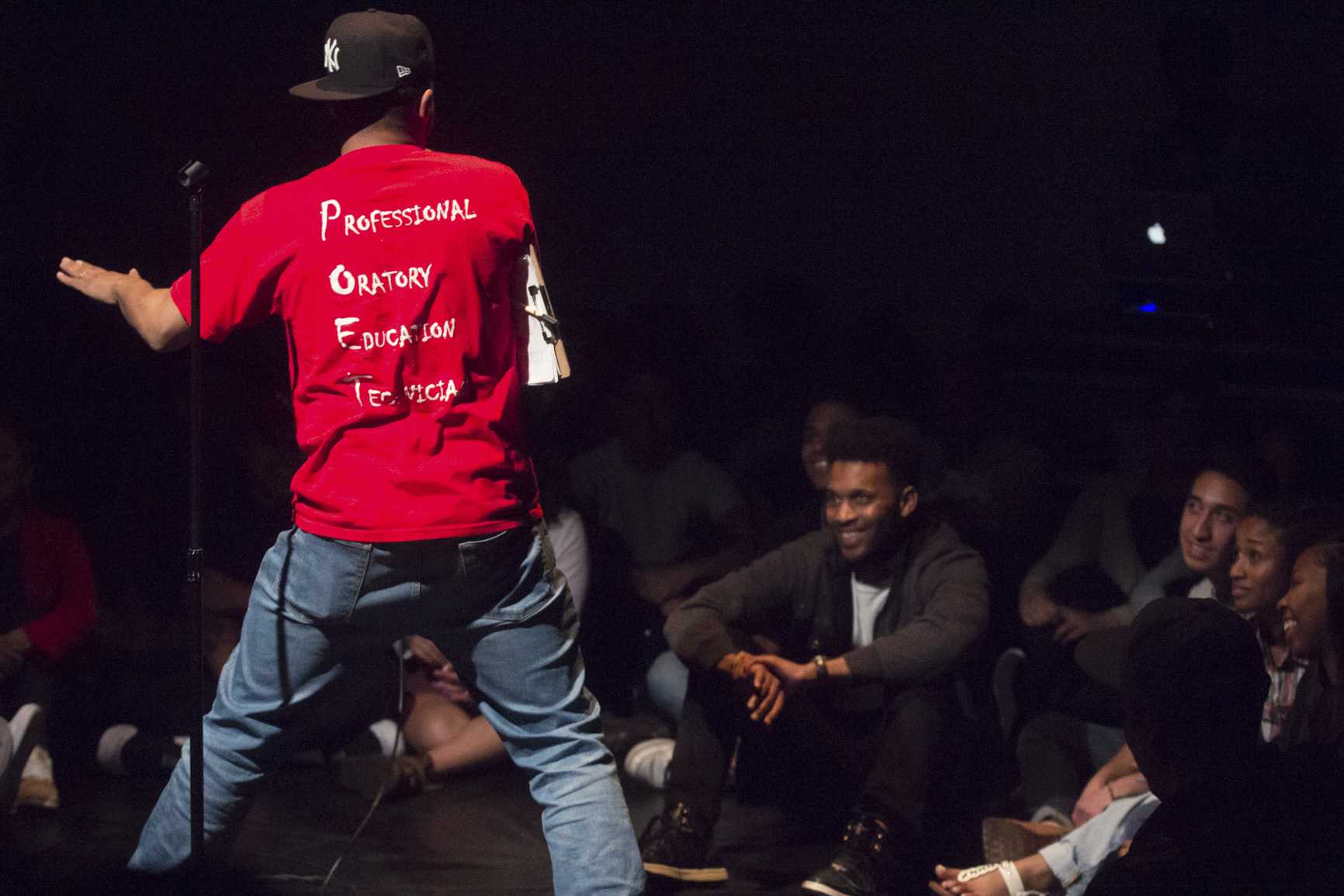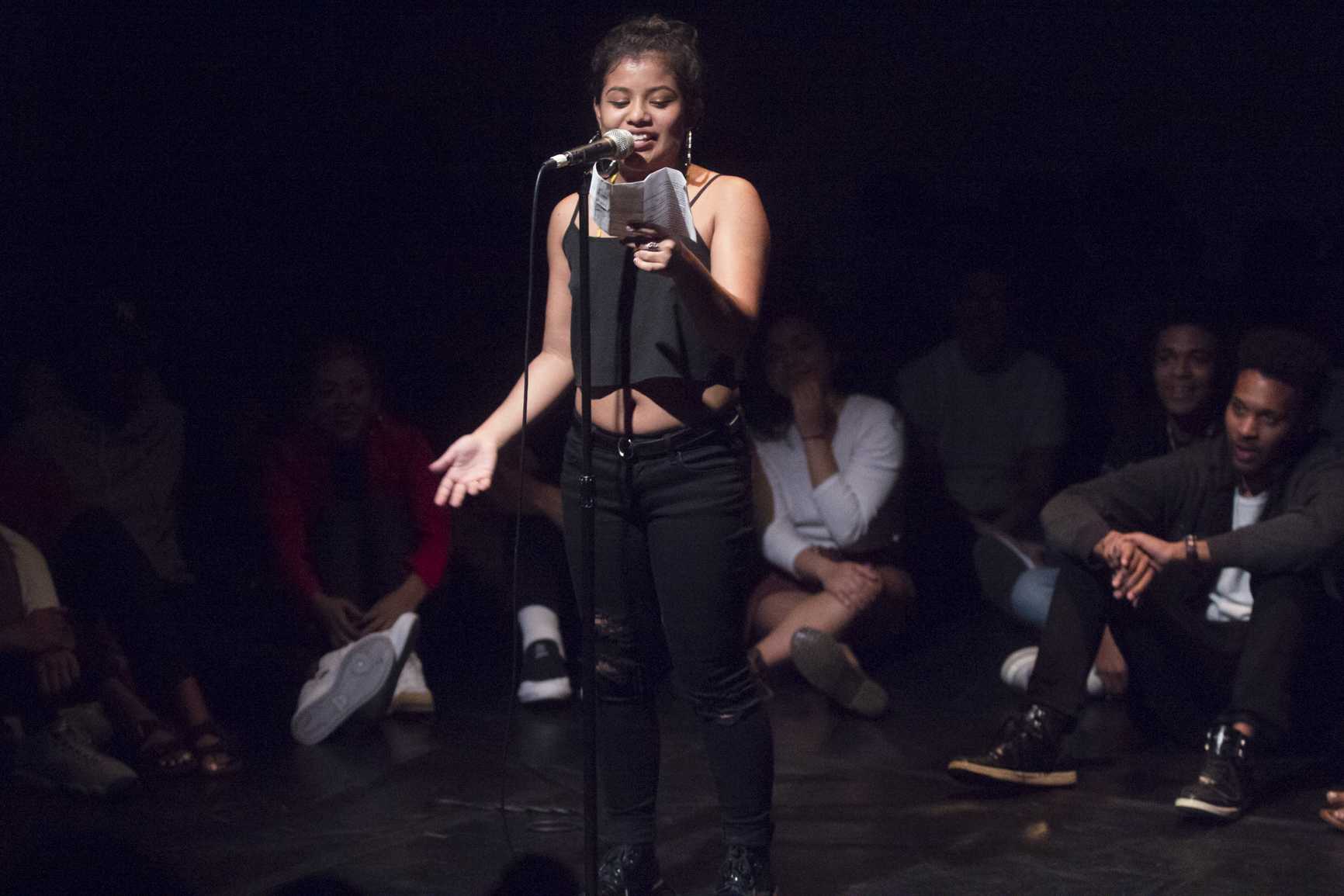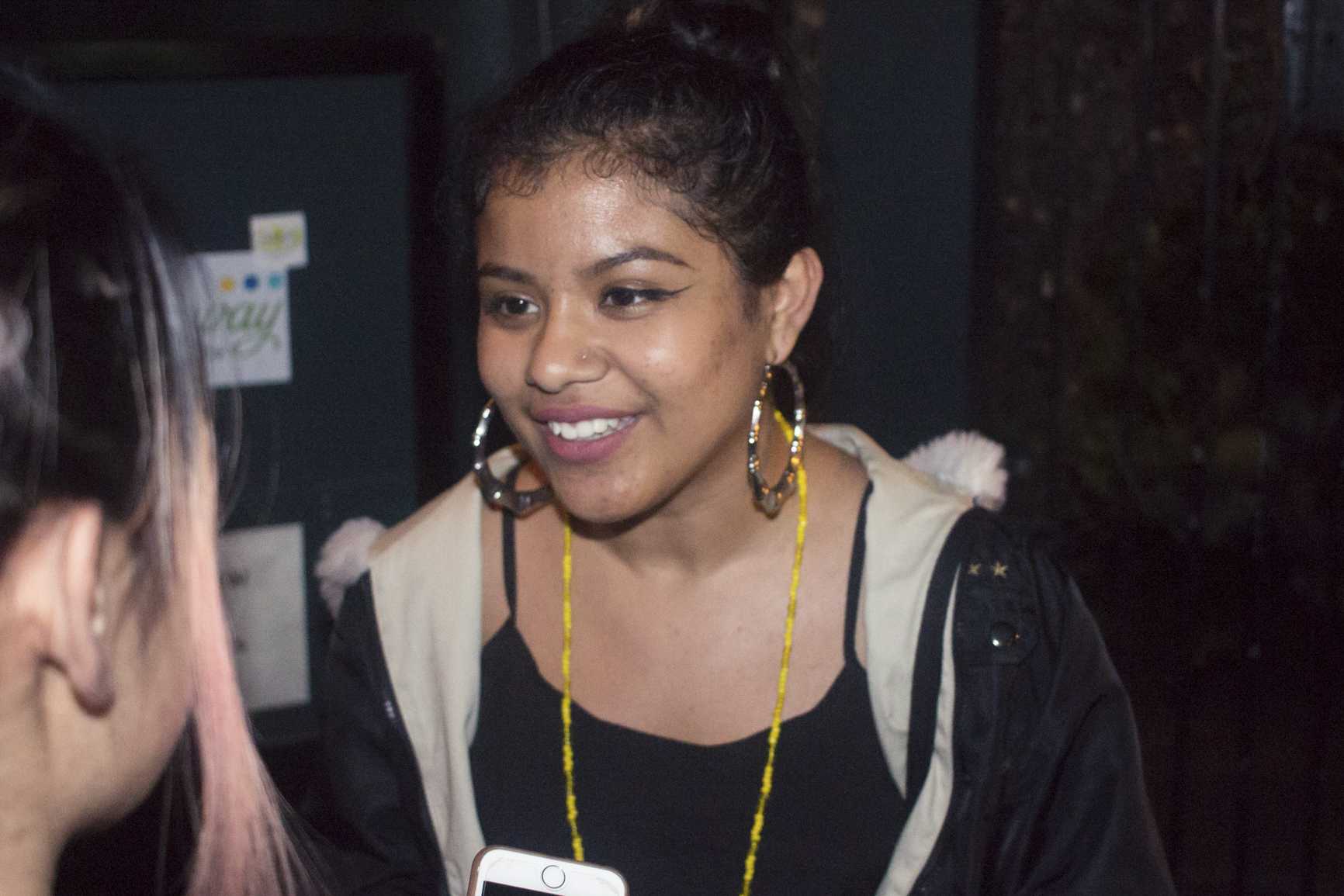Da Poetry Lounge: A Dinner Table of Artists
“We start off every week by asking: ‘Brutha Gimel, what did you do this weekend?’” It’s a loaded question that Shihan Van Clief, the host and co- founder of Da Poetry Lounge, asks in front of an audience of more than 250 people. Some are like family, loyal artists and listeners who have been attending for more than a decade. Others are essentially strangers, first-timers -- like voyagers in a foreign land. If it is someone’s first time at Da Poetry Lounge, the entire experience can seem foreign.
A dark ambiance graces the theater except for a warm yellow spotlight that hits the stage. The small performance space is packed to the brim, and for those unable to grab a seat in time, the stage is their communal bench. There are so many people in the Greenway Court Theatre on Fairfax Avenue that they form a circle around the single microphone on stage, like a halo. They stare up at Van Clief as he asks Gimel, a DJ, and one of four founders which also include Dante Basco and Poetri, what he did that weekend.
“It didn’t happen over the weekend but it happened yesterday,” Gimel, replied. He talked about an encounter from the day before when a random child and the child’s mother confronted him in a store. The recollection made the audience laugh.
A night at the lounge is like a family dinner with friends and strangers alike. It doesn’t matter whether or not you asked to be a part of the scene - you just are. Van Clief talks to the audience as if he were at a dinner table and not as if he were holding a microphone, like when he asks them what movies they watched recently and whether or not they liked it. The warmth that he and Gimel bring to the stage is only one facet of the magic that is Da Poetry Lounge.
And it all started in a living room.
For three years, people gathered at the home of Dante Basco, another of the venue’s founders, to perform spoken word. Fast-forward 19-years later, and Da Poetry Lounge, which has events every Tuesday night, came to be known as the nation’s largest open-mic venue.
It emerged as a haven for artists wanting to get their work publicized; it became an acclaimed safe space for people wishing to voice their vulnerabilities in front of a crowd. The lounge started with the humble goal of wanting to encourage self-expression and fellowship through spoken word, then became so much more than that. “I really think that we are the MTV of poetry,” Brutha Gimel said.
“Da Poetry Lounge is like a monumental place for the poetry industry,” said Willis Ryder, a 22-year old performer. Ryder is from Oklahoma City and has lived in Los Angeles for eight months. “So, I come here just to sharpen my craft, and to just gain followers,” he said.
Corey Taft, a 33-year old Los Angeles resident, has attended Da Poetry Lounge as both a performer and an audience member for 15 years. “This is every single week,” Taft said while reciting a list of reasons that keeps him coming back. “The room is packed. You got a great host, you got a great community, a great family. It’s easy to come back. It’s like a no-brainer. Sometimes you don’t go for a couple weeks and you’re like, ‘I need to go, I need to go, I need to go,’” said Taft.
The diverse community within the theater has forged strong ties between performers and audience members alike that would otherwise never exist.
“It wasn’t until after high school that I was looking into my roots and everything because it never really occurred to me that that was important,” Christian Santos, a 19-year old from Torrance, said. Santos is of an El Salvadorian background and has been attending Da Poetry Lounge for about a year as both an audience member and a performer. “Politically, with everything that’s going on, I thought it was really important for me to really identify as Latino and really embrace that,” he said.
Santos recalled feeling inspired by Chingona Fire, a Latina poetry collective composed of Angela Aguirre and Yesika Salgado, who has performed at the Lounge. “Seeing more Latinos in the community has really inspired me to be more about myself and my writing,” Santos said, “because that pushed me to read more and ask my mom and grandma stories about how they came here. It opened more of a discussion within my household."
In addition to eliciting a sense of cultural pride within people, the venue also produced new friendships.
Other people at the lounge included Paradise Lane, a Beverly Hills resident who recalled his beginnings in creative writing as early as fourth grade. When Matt Greene, of West Hollywood, interjected, “And he’s in 9th now!” they laughed together the way friends who have known each other for a lifetime would. In reality, the pair only met a year ago. Lane is one of Da Poetry Lounge’s loyal followers and performers. He has been attending for years, while Greene felt motivated to start performing only after the most recent presidential election.
Da Poetry Lounge works like this: if you want to perform during open mic nights, you need to get there early to sign up. It works on a "first-come-first-served" basis, which usually means that performers wait three to four hours prior to the actual start of the show.“To wait three hours for your three minutes -- the fun is being on the bench as well,” said Greene. “You get to meet all these people you would never meet and talk to,” he explained.
Inside, poets crawl into every crack and crevice of their emotions, and the work they showcase reflects that. Performances take you to Shakespearean heights, lifting you out of your seat in laughter in one moment and dropping you to raw unflinching heartbreak in the next. In one performance, a man raps to a remixed version of the Itsy-Bitsy Spider song, while the audience laughs boisterously and sings along. Then, in the very next performance, another man performs a poem about death, loss, and neglect that chills the audience within seconds. The juxtaposition is jarring, but this is the way of Da Poetry Lounge.
“Women like me birthed you,” said 17-year old La Morenita during her performance. “And women like me will destroy you. I will not call you papi -- I will son you,” she said. In this case, appreciative finger snapping just didn't cut it anymore. Instead, the audience howled, rose out of their seats, and stomped their feet on the floor in support of her triumphant words. She beamed at their response, riding the wave of their energy as graciously as possible.
Morenita, who was bullied as a child, sees Da Poetry Lounge as a familiar comforting place. “It gave me safety,” she said. “I come here when I’m really distressed, and everyone here is like a family.”
“There’s a sort of process that you see when you get adopted into the family,” Edwin Bodney, of Los Angeles, said. Bodney has been attending Da Poetry Lounge since he was 15 and is now 27 years-old and one of the co-hosts. He also has his own book of poetry, “A Study of Hands,” published last winter. “You sort of establish these really new but really profound relationships. Because one of the interesting things about meeting people at the Lounge, especially for someone who’s reading and someone who’s listening, [is that] you know really, really detailed and vulnerable things about people before you know simple things, like their favorite color,” said Bodney.
When performers lay out their vulnerabilities onstage, the lounge's audience graciously empathizes with them and their struggles. Here being weak is a sign of strength and an even truer sign of being a poet. “The energy is just there,” Bodney said. “What’s great is that it’s guided by us, but it’s cultivated by the community.”
“We’re the initial founders,” Brutha Gimel said, referring to Dante Basco, Shihan Van Clief, Poetri, and himself, “but we definitely had a core group of people who aren’t necessarily considered the founders; but they’re the DPL family. So, by no means was it just four guys pushing it forward,” said Gimel.
And forward it goes. Every Tuesday night, both poetry veterans and newcomers take the stage that so many artists of different backgrounds have ascended before them. It is almost like a holy place, where the words they speak are like prayers they know will be heard by someone, everyone.
One of the last acts was a girl who admitted how nervous she was once she got on the mic. Without hesitation the audience vocally rushed to her support, responding with shouts of encouragement and empathy.
Behind her onstage, standing at his mix table, DJ Fish reassured her, “You’re at home.”

